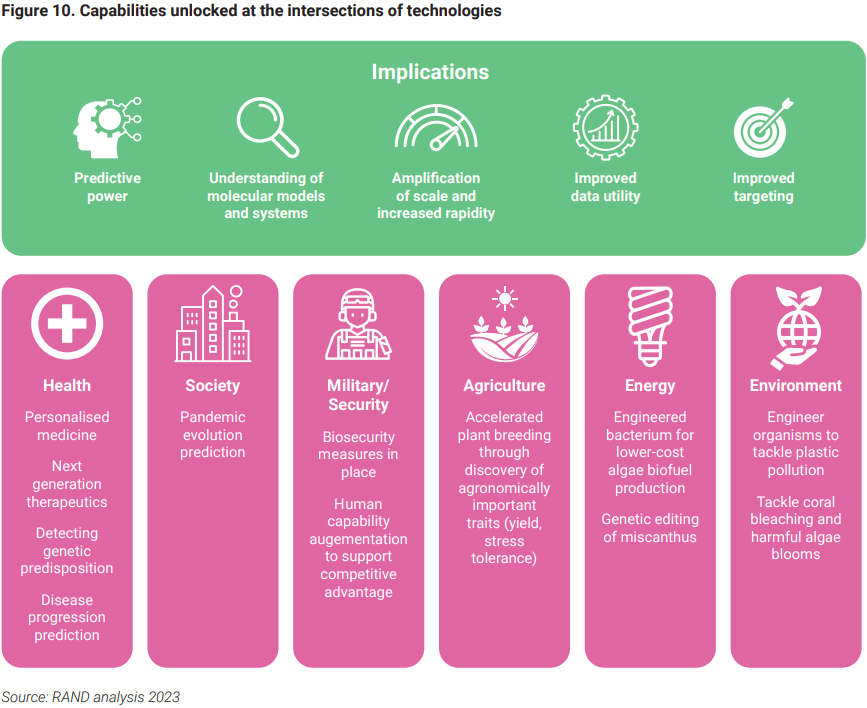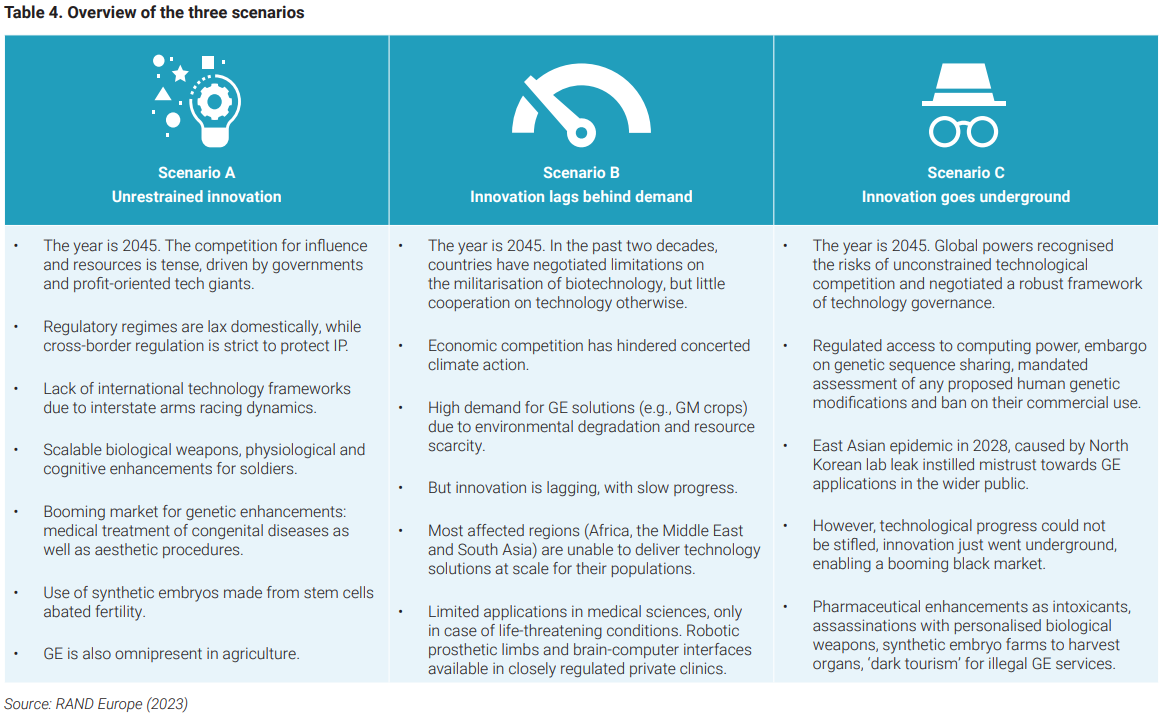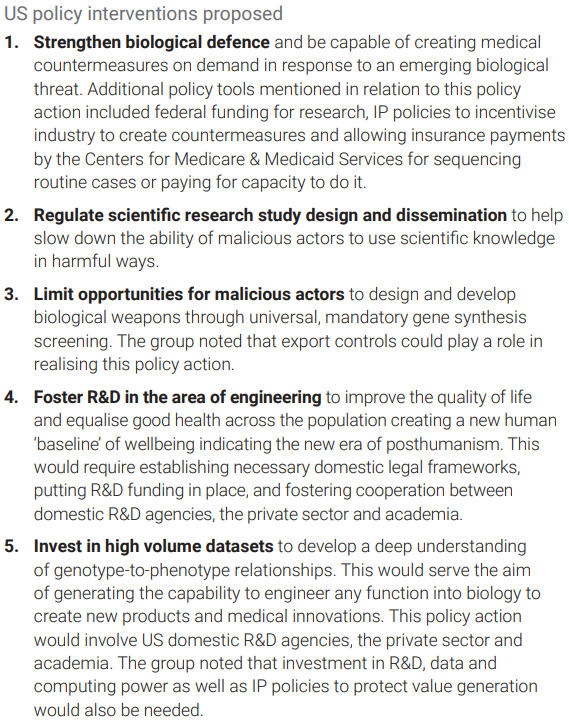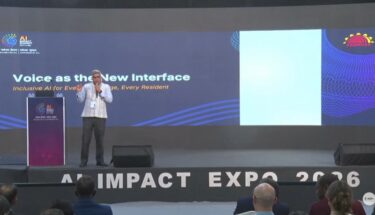Scientists in govt, academia, and industry are thinking about gene editing & AI as catalysts moving society towards a posthumanism future: perspective
By the year 2045, gene editing and Machine Learning R&D could indicate “the start of the posthumanism era,” according to one futuristic scenario from a tabletop exercise organized by RAND Europe.
On Monday, RAND published a 112-page report called “Machine Learning and Gene Editing at the Helm of a Societal Evolution,” which included the results of a tabletop exercise exploring what types of policies could be implemented in about 20 years from now should innovation in these areas become unrestrained, head underground into the black market, or lag behind the demand.
The report also explores how the merger of Machine Learning (ML) and gene editing (GE) “can lead to breakthroughs that may vastly improve lives,” such as improved healthcare and advancements in agriculture, but that the intersecting disciplines “may also be used for nefarious purposes,” such as “assassinations with personalized biological weapons” or “synthetic embryo farms to harvest organs.”

To roleplay potential scenarios taking place in the year 2045, RAND called upon “13 experts on ML and bioengineering from government, academia, industry, and RAND,” who would be split into three teams: one for the US, one for China, and one for the European Union and the UK.
“The US group produced five policy actions in the first instance. These were focused heavily on national security centric regulation while also on fostering R&D, more specifically augmenting the population to an equal baseline of health and wellness as a starting point, indicating the start of the posthumanism era”
“Machine Learning and Gene Editing at the Helm of a Societal Evolution,” RAND, October 2023
With four or five people per group, each team came up with policy interventions across three fictitious scenarios involving AI and gene editing (see image below).

Bearing in mind that the scenarios and policy proposals were “not meant to be interpreted as predictions or forecasts,” one of the policy interventions put forth by Team USA was to “foster R&D […] to equalize good health across the population creating a new human ‘baseline’ of wellbeing indicating the new era of posthumanism.”

“Foster R&D […] to equalize good health across the population creating a new human ‘baseline’ of wellbeing indicating the new era of posthumanism“
Futuristic AI & GENE EDITING Policy Proposal, RAND TableTop Exercise
Now, you may be wondering, “What on earth is posthumanism?”
Don’t worry! You’re not alone.
According to NYU professor Dr. Francesca Ferrando, there are at least three different movements of posthumanism that mean different things to different people:
- Critical Posthumanism (rooted in Marxist critical theory)
- Cultural Posthumanism
- Philosophical Posthumanism
All three posthumanism(s), according to Dr. Ferrando are about the deconstruction of the human, which the professor breaks down into three components:
- Post-humanism: The human is not one, but many. There is not one type of human, but many types.
- Post-anthropocentrism: The human is not considered the most important species.
- Post-dualism: The human is seen in interconnected ways, no longer in dualistic ways.
With this in mind, we can start to understand what the participants in the RAND tabletop exercise were thinking when they talked about equalizing good health across the population and “creating a new human ‘baseline’ of wellbeing indicating the new era of posthumanism.”
With gene editing and AI, everyone can be made equal when it comes to healthcare, like in socialist systems, which ties back to the Marxist branch of posthumanism.
But the RAND report doesn’t stop at equalizing health and wellbeing when talking about the future of AI and gene editing.
According to RAND, “These technologies are possible solutions to problems of global health, climate change, health equity and other pressing issues.”
For example:
“Creating enzymes to eat plastic and pollutants (e.g., forever chemicals), artificial meats and biofuels could dramatically alter the world we live in in the near and distant future”
“Machine Learning and Gene Editing at the Helm of a Societal Evolution,” RAND, October 2023
The links between AI, gene editing, and posthumanism with respect to public health, food systems, and climate aren’t new.
University of Oxford professor Dr. Jamie Lorimer argued back in 2009 that the “emerging posthuman sensibility has been triggered by concerns and debates over innovations, events, and crises in a number of diverse arenas,” including “development in technoscience (e.g., genetic modification, artificial intelligence, nanotechnology, and reproductive technologies), the food system (like the risk of ‘mad cow disease’ and the rise of the organic movement), public health (in the form of zoonoses such as avian influenza), and climate science (where the diagnosis of climate change has demonstrated the global reach of anthropogenic activity).”
Like the participants in the RAND exercise, Dr. Lorimer observed 14 years earlier that there was a sense we were crossing a threshold and “entering a new era.”
“For some technocratic optimists this brave new world is full of the emancipatory promise of modern science […] For more conservative and environmentalist critics, this novel posthuman condition is apocalyptic and threatens our human identity and the future habitability of the planet“
Dr. Jamie Lorimer, “Posthumanism/Posthumanistic Geographies,” 2009
For RAND’s chosen experts, that new era of posthumanism was about equalizing health with a new human baseline of wellbeing (i.e. socialized healthcare).
Dr. Lorimer also observed the potential health benefits that a new era of posthumanism could bring, but he also saw how it could turn dystopian.
“For some technocratic optimists this brave new world is full of the emancipatory promise of modern science. It presents new opportunities for human enhancement, individual self-realization, and significant new arenas for (capitalist) economic growth and profit,” he wrote.
“For more conservative and environmentalist critics, this novel posthuman condition is apocalyptic and threatens our human identity and the future habitability of the planet.”
“Posthumanism and transhumanism designate different intellectual schools that contradict one another in fundamental issues […] Transhumanism works with man, his natural limitations, and potential options for his removal. Posthumanism, in turn, expands the very space of agency by including nonhuman objects and rejecting the binary oppositions human−nonhuman, culture−nature, or humanism−antihumanism”
“Posthumanism vs. Transhumanism: From the ‘End of Exceptionalism’ to ‘Technological Humanism,'” Herald of the Russian Academy of Sciences, September 2022
It may be of interest to note that posthumanism is not the same as transhumanism.
Going back to Dr. Ferrando at NYU, posthumanism is about deconstructing the human and its place in the world — away from anthropocentrism — while transhumanism is all about enhancing human capabilities.
Posthumanism and transhumanism aside, the RAND report adds that ML and gene editing can be used for good or nefarious purposes.
According to the report, “Most of the implications and thus applications of these advancements fall under the medical sector with some uses in agriculture, energy and climate, but there is potential for their use in other sectors like the military, national security or human performance.”
In particular, “Experts are concerned about the capabilities in creating synthetic compounds that could cause disease, avoid detection and vetting, and potentially create pandemics or global bioterrorism events.”
Apart from the tangible, real-world applications that ML and gene editing can deliver, there are scientists in government, academia, and industry who are thinking about these capabilities as catalysts to move society towards an ideological, posthumanism future.
But hey! These were all just fictional scenarios, weren’t they?
Image by Freepik












